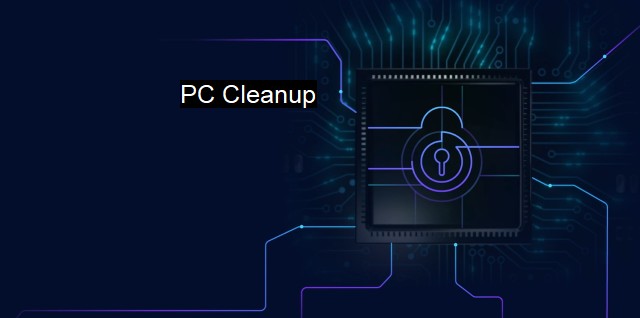What is PC Cleanup?
Explaining the Importance of PC Cleanup for Cybersecurity: How to Protect Your Computer from Malicious External Threats
PC cleanup is an essential process that involves removing unnecessary files, programs, and fragments of data from a computer's hardware. Its aim is to keep the computer running smoothly and to enhance its performance by removing any malware or other system-hogging information stored in the data. It's similar to a household spring clean where unused items, clutter, and dirt are removed to create a healthier, more purposeful space.PC cleanup relates to the removal of malicious applications, software, or content that could potentially harm the computer or compromise its privacy channels. Many harmful programs are designed to infiltrate computers, gather sensitive data and cause other malicious activities that are detrimental to the user. For instance, malware, spyware, or phishing links can steal personal data, interrupt computer operations or even delete files without the user's permission.
An antivirus software cleans up a PC by detecting, neutralizing, and removing all forms of potentially hazardous content. It can remove these harmful programs either manually or automatically via a scanning process. Either way, antivirus software uses a database of known virus threats to identify and counteract such threats effectively. It goes beyond detecting potential issues, but also prohibits them from entering the system and cleans them out before they embed themselves and start causing havoc.
Another important aspect of PC cleanup is the removal of junk and temporary files. These are usually built up as a result of frequently-used applications and browsing the internet. Although the data they contain is usually harmless, they can consume valuable hard disk space, thereby reducing the efficiency and speed of the computer. Hence, a comprehensive PC cleanup process involves clearing browser caches, cookies, download history, as well as dismantling lingering data from uninstalled applications.
As with physical clutter having a negative impact on our environment and mental wellbeing, digital clutter also harms our productivity. It slows down our computers, causes errors and crashes, and makes it hard to locate files and folders when we need them. Not to mention the risk of exposing personal or financial information to prying eyes. Let alone, some spyware is capable of attaching itself to junk files – making junk files neither beneficial nor innocuous for your system.
On top of that, old or outdated software versions can pose a risk. Developers frequently update software to protect against new security threats, improve functionality, and compatibility. Therefore, if you forget to update, you may be leaving vulnerabilities in your system. Outdated applications and systems make your computer susceptible to newer versions of malware and virus threats, making it another primary step in the PC cleanup process.
Disk defragmentation is a recurrent process of PC cleanup that improves performance by making your information easier to access. It arranges related segments of data closer together in the disk drive. The closer your data, the faster your computer can access it, thereby increasing your PC’s speed.
PC cleanup is an indispensable tool to enhance computer performance, make them faster, run more efficiently, and maintain their overall health. Plus, regularly performing PC cleanup will help sustain a secure and virus-free environment. Therefore, never underestimate a proper PC Cleanup, because just like your home, your virtual world also deserves the utmost care and attention.

PC Cleanup FAQs
What is PC cleanup?
PC cleanup is the process of removing unwanted and unnecessary files, programs, and data on a computer to improve its performance and free up space. In the context of cybersecurity and antivirus, PC cleanup involves removing malware, spyware, and other viruses that may be present on the computer.Why is PC cleanup important for cybersecurity?
PC cleanup is important for cybersecurity because it helps to remove malware, spyware, and other viruses that may compromise the security of your computer. These malicious programs can steal your personal information, slow down your computer, or even damage it irreparably. By regularly cleaning up your PC, you can help to prevent these security threats and keep your computer running smoothly.How often should I do a PC cleanup?
The frequency of PC cleanup depends on how much you use your computer and what you use it for. As a general rule, you should aim to do a PC cleanup at least once every three months. However, if you use your computer for work, gaming, or other resource-intensive tasks, you may need to do it more frequently. It's also a good idea to do a PC cleanup after installing or uninstalling programs, as this can often leave behind unnecessary files and data.What should I look for when choosing a PC cleanup tool?
When choosing a PC cleanup tool, you should look for one that is reputable, easy to use, and tailored to your needs. A good PC cleanup tool should have features such as malware detection and removal, junk file removal, registry cleaning, and system optimization. It should also be regularly updated to address new security threats and performance issues. Additionally, you should look for a tool that is compatible with your operating system and that has a good track record of user reviews and ratings.| | A | | | B | | | C | | | D | | | E | | | F | | | G | | | H | | | I | | | J | | | K | | | L | | | M | |
| | N | | | O | | | P | | | Q | | | R | | | S | | | T | | | U | | | V | | | W | | | X | | | Y | | | Z | |
| | 1 | | | 2 | | | 3 | | | 4 | | | 7 | | | 8 | | |||||||